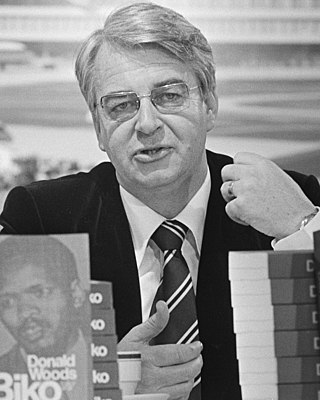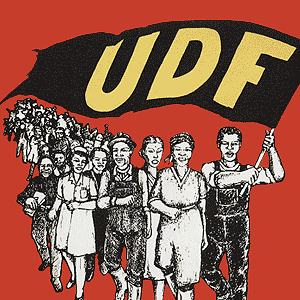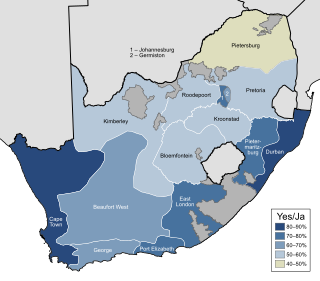
Soweto is a township of the City of Johannesburg Metropolitan Municipality in Gauteng, South Africa, bordering the city's mining belt in the south. Its name is an English syllabic abbreviation for South Western Townships. Formerly a separate municipality, it is now incorporated in the City of Johannesburg Metropolitan Municipality, and one of the suburbs of Johannesburg.

The Eastern Cape is one of the nine provinces of South Africa. Its capital is Bhisho, but its two largest cities are East London and Gqeberha. Due to its climate and nineteenth century towns, it is a common location for tourists. It is also known for being home to many anti-apartheid activists, the most famous being Nelson Mandela hailing from the province.

Pieter Willem Botha, was a South African politician. He served as the last prime minister of South Africa from 1978 to 1984 and the first executive state president of South Africa from 1984 to 1989.

Donald James Woods was a South African journalist and anti-apartheid activist. As editor of the Daily Dispatch, he was known for befriending fellow activist Steve Biko, who was killed by police after being detained by the South African government. Woods continued his campaign against apartheid in London, and in 1978 became the first private citizen to address the United Nations Security Council.

Rondebosch is one of the Southern Suburbs of Cape Town, South Africa. It is primarily a residential suburb, with shopping and business districts as well as the main campus of the University of Cape Town.

Uitenhage, officially renamed Kariega, is a South African town in the Eastern Cape Province. It is well known for the Volkswagen factory located there, which is the biggest car factory on the African continent. Along with the city of Port Elizabeth and the small town of Despatch, it forms the Nelson Mandela Bay Metropolitan Municipality.
Brandfort, officially renamed Winnie Mandela in 2021, is a small agricultural town in the central Free State province of South Africa, about 60 km northeast of Bloemfontein on the R30 road. The town serves the surrounding farms for supplies and amenities. It is well known for once being home to the anti-apartheid stalwart and wife of Nelson Mandela, Winnie Mandela, during her banishment.

Gqeberha, formerly known as Port Elizabeth, and colloquially referred to as P.E., is a major seaport and the most populous city in the Eastern Cape province of South Africa. It is the seat of the Nelson Mandela Bay Metropolitan Municipality, South Africa's second-smallest metropolitan municipality by area. It is the sixth-most populous city in South Africa and is the cultural, economic and financial hub of the Eastern Cape.

Apartheid was a system of institutionalised racial segregation that existed in South Africa and South West Africa from 1948 to the early 1990s. Apartheid was characterised by an authoritarian political culture based on baasskap, which ensured that South Africa was dominated politically, socially, and economically by the nation's minority white population. In this minoritarian system, there was social stratification and campaigns of marginalization such that white citizens had the highest status, with them being followed by Indians as well as Coloureds and then Black Africans. The economic legacy and social effects of apartheid continue to the present day, particularly inequality.

Mthatha ; Xhosa:[ḿ̩ˈtʰâːtʰà], alternatively rendered Umtata, is the main town of the King Sabata Dalindyebo Local Municipality in Eastern Cape province of South Africa and the capital of OR Tambo District Municipality. The city has an airport, previously known as the K. D. Matanzima Airport after former leader Kaiser Matanzima. Mthatha derives its name from the nearby Mthatha River which was named after the sneezewood (umtati) trees, famous for their wood and medicinal properties.

The United Democratic Front (UDF) was a South African popular front that existed from 1983 to 1991. The UDF comprised more than 400 public organizations including trade unions, students' unions, women's and parachurch organizations. The UDF's goal was to establish a "non-racial, united South Africa in which segregation is abolished and in which society is freed from institutional and systematic racism." Its slogan was "UDF Unites, Apartheid Divides." The Front was established in 1983 to oppose the introduction of the Tricameral Parliament by the white-dominated National Party government, and dissolved in 1991 during the early stages of the transition to democracy.

A referendum on ending apartheid was held in South Africa on 17 March 1992. The referendum was limited to white South African voters, who were asked whether or not they supported the negotiated reforms begun by State President F. W. de Klerk two years earlier, in which he proposed to end the apartheid system that had been implemented since 1948. The result of the election was a large victory for the "yes" side, which ultimately resulted in apartheid being lifted. Universal suffrage was introduced two years later.

Gugulethu is a township in the Western Cape, South Africa and is 15 km from Cape Town. Its name is a contraction of igugu lethu, which is Xhosa for our pride. The township was established along with Nyanga in the 1960s.

Rugby union in South Africa is a highly popular team sport, along with cricket and soccer, and is widely played all over the country. The national team is among the strongest in the world and has been ranked in at least the top seven of the World Rugby Rankings since its inception in 2003. The country hosted and won the 1995 Rugby World Cup, and won again in 2007, 2019 and 2023.

Green Point is an affluent suburb on the Atlantic Seaboard of Cape Town, South Africa located to the north west of the central business district. It is home to Cape Town Stadium, a major sporting venue that was built for the 2010 FIFA World Cup. Sea Point promenade runs through the suburb, connecting it to Three Anchor Bay and Sea Point, a popular Jewish neighbourhood. Somerset Road forms the main thoroughfare lined by restaurants, cafés, delis, boutiques and nightclubs.
Bizana is a town in the Eastern Cape province of South Africa. It is the seat of the Winnie Madikizela-Mandela Local Municipality.
Crawford is a suburb of Cape Town, South Africa, located to the east of the City Centre (CBD) on the Cape Flats to the south of the N2 highway. The suburb is surrounded by the suburbs of Lansdowne, Rondebosch East, Athlone, Belthorn Estate, Rylands, and Belgravia. The main roads through the area are Jan Smuts Drive (M17) and Turf Hall Road (M24) linking to the M5. Thornton Road was for many years the main thoroughfare for this suburb and a hotbed for anti-apartheid activity in 1976 and 1985. Thornton Road is the location of the Trojan Horse Memorial in honour of those killed in 1985. Crawford is served by a railway station of the same name on the Cape Flats Line.

Netherlands–South Africa refers to the current and historical relations between the Netherlands and South Africa. Both nations share historic ties and have a long-standing special relationship, partly due to the Dutch colony in the Cape, linguistic similarity between Dutch and Afrikaans and the Netherlands' staunch support in the struggle against Apartheid.

Hanover Park is a neighborhood of the City of Cape Town in the Western Cape province of South Africa
The following is a timeline of the history of Port Elizabeth in the Nelson Mandela Bay Municipality, Eastern Cape province, South Africa.

















